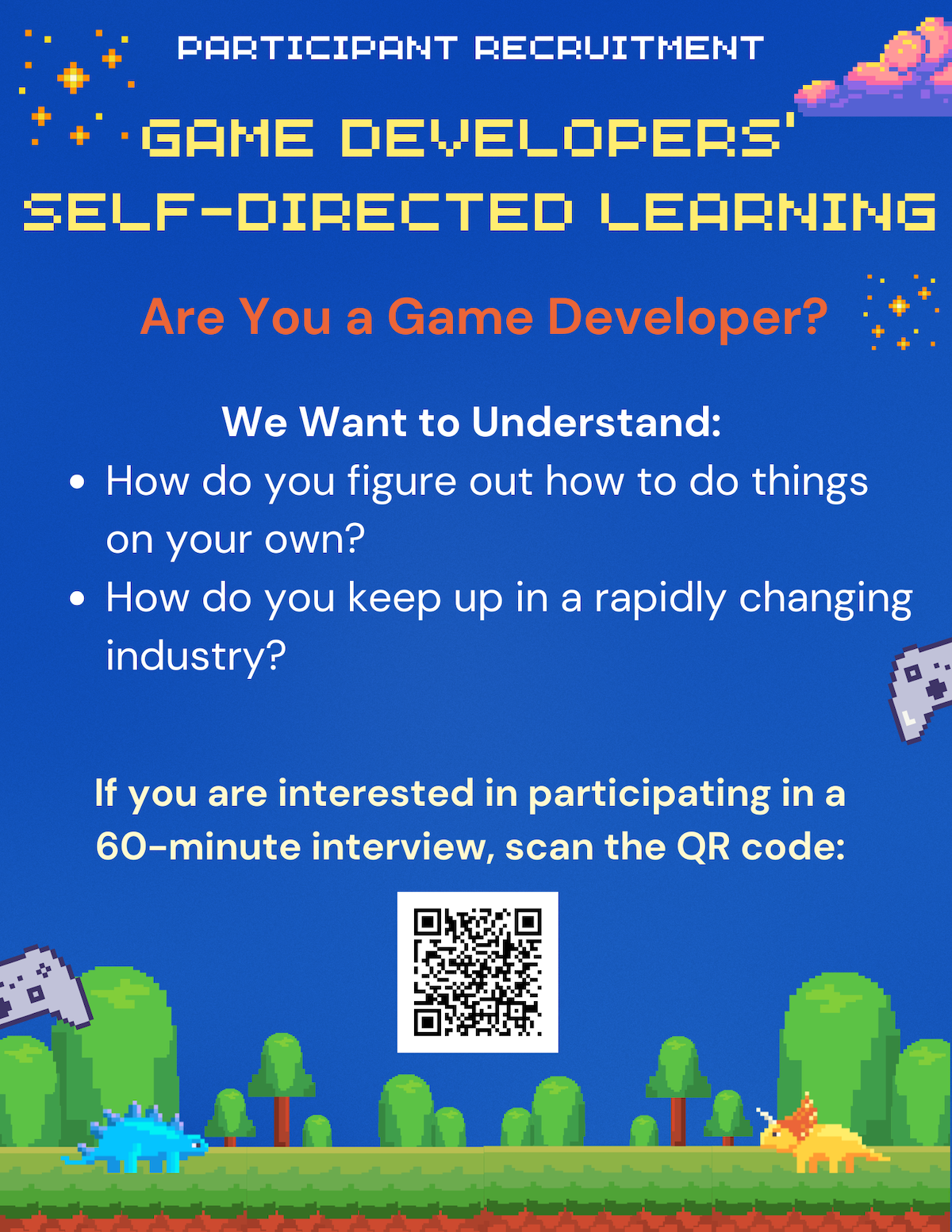New Study: Game Developers' Self-Directed Learning

Study Overview
In this study, we are exploring self-directed learning (SDL) among game developers, investigating how you acquire and enhance skills in an industry marked by rapid technological evolution and shifting consumer interests.
Through interviews with game developers, we aim to uncover the motivations behind your engagement in SDL and the strategies you employ to overcome associated challenges.
We expect our findings to inform educational programs and resources tailored to the unique learning needs of professionals in the gaming industry and other rapidly changing fields.
If you’d like to tell me your self-directed learning stories, please email me!
By completing this brief questionnaire, you are indicated your interest in participating in a 60-minute Zoom interview with Dr. Bret at mutually convenient time. We will use your responses to this survey to purposively select interview participants.
Thank you for your interest!
Introduction
In this study, we want to find out more about how game developers engage in self-directed learning to acquire and enhance their skills. I am asking you to be in this study because you are a professional working in the games industry. If you agree to participate, I will ask you to answer some questions about your own experiences and processes of learning in the video games industry.
Your involvement in the study will last less than one hour. If you want to stop at any time, just tell me and we will stop. You don’t have to be in this research study. You can say yes now and still change your mind later, at any point.

Research Objectives
The purpose of this study is to explore how game developers engage in self-directed learning to acquire and enhance their skills.
Three research questions guide this exploration:
- Why do game developers engage in self-directed learning?
- How do game developers navigate any challenges they face during self-directed learning?
- What supports do game developers seek during the self-directed learning processes?
Findings from this study will be used to better understand game developers’ autonomous self-teaching processes. Understanding game developers’ self-directed learning offers implications for educational theory and practice. First, insights from this study can inform the design and development of educational programs and resources tailored to the distinct needs of individuals in the games industry. Second, insights can facilitate the creation of interventions and support mechanisms that nurture effective self-directed learning for professional in a variety of technology-driven industries including education and healthcare. Third, this research will add empirical data to further enhance and validate a context-aware self-teaching framework.
Background
The gaming industry is marked by swift technological advancements, evolving consumer preferences, and an ongoing demand for innovation. This expansive industry encompasses a diverse array of disciplines, including programming, art, design, sound engineering, and narrative writing. Professionals within this domain must continuously acquire fresh skills and knowledge to retain competitiveness. Yeo (2008) underscored that 80% of workplace learning occurs informally, predominantly through self-directed means. As a result, learning within the gaming industry frequently manifests through self-teaching, steered by individual learners’ motivations, objectives, and the resources available to them.
Although existing research has explored self-directed learning in workplace contexts, few studies, if any, have examined self-directed learning specifically within the gaming industry. The current study endeavors to contribute to the knowledge base by offering novel insights into game developers’ self-directed learning.
By revealing patterns and trends in self-directed learning among game developers, the study may inform the design of more tailored and effective educational programs, resources, and support systems. This, in turn, could enhance the professional development and skill acquisition of future game developers, leading to a more skilled and innovative workforce within the industry. Furthermore, the research findings may contribute to the advancement of theoretical frameworks and understanding of self-directed learning processes, benefiting researchers and educators in related fields.
Reference
Yeo, R.K. (2008). How does learning (not) take place in problem-based learning activities in workplace contexts? Human Resource Development International, 11, 317–330. https://doi.org/10.1080/13678860802102609